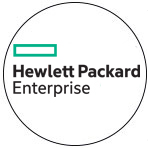

Working at Hewlett Packard Enterprise (HPE) wouldn’t suit every lawyer. If you yearn for walls spotted by Damien Hirst, encrusted with crackly oils of senior partners from days of yore or plastered with impassioned corporate values, you’d be disappointed. Desks groaning with gonks, or festooned with file boxes or framed pictures of you losing your lunch on the Corkscrew? Colour, of any kind? Ha, you wish. The overall effect is a little, er, Spartan.
Whether the austere décor is one of deputy general counsel Rob Putland’s little ruses to enable him to better assess how his team is functioning, the team aren’t saying. They just smile and answer any off-the-cuff question without the slightest confirmatory glance towards their boss.
‘These walls are too high!’ complains Putland, breaking the reverie in a distinctly un-Spartan manner and nonetheless managing to catch in one hand a miniature rugby ball pitched at speed over a chest-height desk-separator. ‘It’s nice for everyone to be able to see everyone else,’ he clarifies cheerily.
Connection, family and productivity
Putland’s available bench-strength is impressive, in depth, quality and diversity. His lawyers – half women – hail from well-recognised names such as Hogan Lovells, Norton Rose and Baker & McKenzie in London, with his US team members from Skadden, Lathams and Pillsbury (he has a global team of 120 in 18 different countries). But whatever they were in previous lives – corporate, employment, outsourcing, commercial – at HPE they enter a world where their talent and interests govern the direction of their career, and where junior lawyers are quickly pitched into situations they’d never be let near in private practice.
‘Everything we do is predicated on the people,’ explains Putland. ‘You get the quality people, hire a mix of seniority and create a sensible labour pyramid, that’s the start. But for me it was always about getting the culture right, and getting the team working in a collegiate way and – something you sometimes lose in the law – having a culture of altruism. We do a lot of pro bono work, we’ve won awards for it. If you have a culture of altruism, then the senior people spend time helping more junior people and they do that in turn. Then you get smart, engaged lawyers right across the team, and it’s empowering for all of them.’
Nor are Putland’s team bound by the traditional view of what happens in the course of a legal career. One of the team was recruited, then promptly had a baby. She was promoted during her maternity leave. Yes, you read that right. Promoted during maternity leave.
Toto, I don’t think we’re in private practice any more…
The Hewlett Packard Enterprise Legal Team
‘I’m trying to get the best bits of a law firm and the best bits of in-house,’ he says, as if that suffices to explain the palpable cohesion of the HPE team-space. ‘In the 0-5 year range, we have a five-year plan for everyone, with milestones; not just around legal skills, but around all kinds of soft skills too. I want people to feel that they’re growing their career, and we’re using benchmarks to make sure they’ve been able to do better here than they would have done if they’d stayed in private practice.’
‘We want to break away from the classic corporate ladder and create a kind of corporate “trellis”,’ he says, with a grin, ‘a structure full of opportunities in various directions.’
Putland’s team time-records, but not to measure utilisation. ‘I’m not interested in “utilisation”,’ he says. ‘I’m interested in productivity.’ But what does that mean?
Demonstrable advantage
As if by magic – this is a tech company, after all – a presentation pops onto the 60-inch screen above.
The kind of graphs which would give most law firm group heads a minor stroke begin to flick by, carving the question by every desirable measure. Operational effectiveness. Speed to signature. Open workload to revenue. Profit contribution by contract type. Metrics, metrics, metrics. Not just hours notionally-billed by the contracts team, but quality of input. Each lawyer’s contribution to the company’s profit – and to their own career development – in glorious colour, shredded by micro-segment across HPE’s business.
Part of the mindset, evident in talking to the team, is getting lawyers out of thinking like lawyers – people who just ‘do law’.
‘We need lawyers who are genuine business partners. They need to understand the economic drivers to deals. Lawyers traditionally advise clients how to avoid risk. I don’t want lawyers to think like that. I want lawyers who understand that you have to take risk to win and can help optimise that risk.’
But then the proof of the pudding is always in the eating, so what do HPE’s sales teams think?
‘Our business teams want to use our lawyers,’ Putland says, with justified pride. ‘They much prefer using in-house lawyers than going to external lawyers, because they can see and feel the value. The team is motivated to support them, and knows exactly how much it does support them. I want to track that financially, of course, but I also want to track it culturally.’
At HPE, they call this the ‘inside game’, the continuous effort to do more internally. The supporting phrase ‘every dollar counts’ seems almost incidental, but it’s obviously key to the efficient humming of the team-machine.
Putland never uses ‘my’ team, but that choice is not an affectation. He does not see himself as a boss, and the cheery engagement of the team is not in any sense ‘put on for the cameras’. He talks about coaching relationships, reverse-mentoring, a culture where ‘it’s ok for a junior person to coach a senior person.’
This is collegiality at a level most law firms would kill for.
Millenial mojito anyone?
So what is Putland’s secret? Respect for millennials.
‘Millennials are already 50% of the world population and will be 75% of the working population by 2025,’ says Putland breezily, pulling up another graph to ram the horrible realisation home. ‘They get such bad press. Some people say they are fickle, and it’s true, they’ll walk if they don’t get the right level of feedback, or if they’re not doing interesting work. But that’s a good thing. It keeps us on our toes, makes us perform to our promises. Their questions make us better. They challenge the status quo and we need that to help drive innovation.’
Putland points to ‘some absolute superstars’ among his new, youngest hires.
‘It’s ridiculous to me that there’s this level of brain-drain from law firms,’ he says. ‘When I was a young lawyer I would never have made this kind of move at their level, but they’re willing to take that risk, and law firms’ loss is our gain.’
Putland’s view of talent is tailored to – and tailored by – both the cresting wave of millennial engagement with the world of work, and HPE’s advanced HR philosophy.
‘We have a nine-box grid to give us a framework for looking at talent, our talent factory,’ he says, to another slide. ‘Everyone in the organisation is mapped to one of the nine boxes, across two axes, performance and potential.’ The eye skips over boxes which say things like ‘top talent’, ‘superior talent’ and ‘emerging talent’.
‘Most lawyers are in box 3,’ says Putland. ‘Top performer, no potential – an absolutely safe pair of hands’.
‘Controversially, I think we need very few of those people in the organisation. They’re too afraid to make mistakes,’ he says. ‘Here, we say be brave. I’ve got your back.’
‘The way you beat the competition is to be ahead of them. I think there’s a massive lack of innovation in the legal market and there shouldn’t be. Lawyers are clever people. I trust my people. I want them to challenge the current state, innovate. Millennials are technology natives; we are doing a lot of interesting stuff using technology based on ideas from some of the junior members of the team. It’s exciting and all based on having the right people with the right team culture.’

